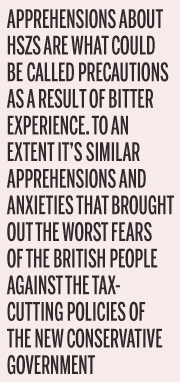
Walking back attempted policy initiatives is a sign of democracy, or a sign of the chaos of administrative hubris? In England it appears to be a bit of both. In Sri Lanka the High Security Zone legislation had been retracted.
In both cases it seems the policymakers realised in retrospect that legislative overreach is not merely a matter of optics. It’s a matter of the impact of policy, even when such impact may be considered relatively meager.
In the UK a 45 percent tax rate on the wealthier folk was jettisoned as a new Conservative Government policy last week. But almost before the ink was dry on the policy announcement, the new initiative was ditched.
This is being heralded by the new Prime Minister and his Chancellor as a sign of flexibility. We have listened, said Kwasi Kwarteng the Chancellor of the Exchequer who had just a few hours back however, announced that the Government will stay the course.
 Why is policy announced if chances are that it would lead to massive controversy, and would have to be retracted? The answer probably is that policymakers do not quite expect the level of backlash to certain initiatives, which certainly seems to have been the case in Britain.
Why is policy announced if chances are that it would lead to massive controversy, and would have to be retracted? The answer probably is that policymakers do not quite expect the level of backlash to certain initiatives, which certainly seems to have been the case in Britain.
The 45 percent tax initiative of course was accompanied by a whole raft of other policy measures, but as far as this particular policy was concerned it was the most grating to people who felt that the Government was doing a “reverse Robin Hood” by attempting to ease taxes on the rich with the result that the poor would have to ultimately pay for those measures.
SPORADIC
High Security Zones in Sri Lanka have a bad rap. Though wartime governments would claim that they served their purpose, in the North the HSZs were considered as, among other things, negating the land rights of people who were summarily dispossessed of lands so that the High Security Zones could be established.
The wartime HSZs were totally unpalatable, but were considered necessary by the Security Forces that had to contend with an enemy that was using both conventional warfare tactics and guerrilla strategies to bolster a violent campaign that succeeded to a great degree, before the armed forces were able to effectively counter-attack.
But a civilian penchant for High Security Zones during essentially peaceful times were not seen as either necessary or desirable by the large mass of politically inclined in society, and others in active politics. Some would argue that the situation that obtained in Sri Lanka during the recent uprising (Aragalaya) was not peaceful by any means.
It was not however a war by a long shot. Though it is true that there were sporadic acts of arson and worse that were committed during this period, by far the essential character of the uprising was that of peaceful protest.
Why HSZs were deemed essential under these circumstances? Perhaps the reasoning was that they would be useful in bringing about an atmosphere of peace and normality after a protracted period of unrest and destabilisation that accompanied the economic meltdown.
But, perhaps the effect was quite the opposite. The presence of HSZs in the city in key areas would send out wrong signals at a time it would be necessary to reassure tourists and investors that the country is essentially back to normal after a long period of uncertainty and general angst.
POLARISED
Perhaps the apprehension within the national security apparatus was that the system was destabilised with a certain amount of ease during the period of uncertainty that followed the economic meltdown during the earlier part of this year. It would have been felt that a repeat should not be allowed to happen under any circumstances.
However, there is no need for a state of readiness that’s wholly unnecessary. In the UK the Government spooked the markets due to the fact that so-called unalloyed conservative economic policies were being launched in the midst of a period of high inflation and economic insecurity.
Extreme conservative measures in any event would not be popular, because they entail tax breaks for the rich and so on but when they come at a time the poorer sections of society feel besieged due to an energy crisis and an economic meltdown due to the repercussions of Covid closures, society becomes polarised, and there are accusing fingers pointed at the policymakers for coddling the rich. Conservative economic policies so called — in the Tatcherite mould — would in any event be seen as favouring the rich over the poor, but the rationale is that these are the necessary means by which economic growth could be ensured.
Even assuming that such a contention was true, a period of dire economic crisis with a war going on in Europe was not the time to experiment with policy that was seen to go beyond what even Margaret Thatcher would have contemplated.
It was the late premier Thatcher herself that’s supposed to have said, “the markets cannot be bucked.” The new Prime Minister of the UK seemed to have discounted a market reaction completely, judging by the fact that her party was totally unprepared for the record slide of the pound sterling against the dollar after her tax-cutting policies were announced.
The point about the tax-cuts that were proposed in the mini-budget of the new Conservative Government under PM Liz Truss were that they were central to matters that had a bearing on the lives of ordinary British people. The housing mortgages of ordinary people were severely affected and the price of goods was bound to go up adding to already debilitating inflationary pressures.
By contrast proposed HSZs that were subsequently deemed unnecessary did not have that kind of impact on the lives of ordinary people, in this country. But Sri Lanka has a history of security related problems, naturally, as a country that came out of a long period of a battle against terrorism and destabilisation.
STEROIDS
In this context the HSZs are not welcome because this is a country that’s recovering from a period of hostilities. It’s been thirteen years since the battle against terrorism ended, but memories endure. For a country that was embroiled in a battle against terrorism for over twenty-five years, thirteen years of recovery is not a long enough time-gap to forget.
People are not inclined to give up their hard won freedoms. It’s the people that sacrificed the most at the altar of the battle against terrorism, next to the Security Forces. It’s their taxes that funded that effort, and it’s the people that suffered as a result of a lack of investment and so on due to the perils of the battle against terrorism related restrictions.
Even though there is a different set of economy related problems now, that have kept investors from Sri Lanka, these problems are not of the security related kind, where fundamental freedoms are seen to be at stake.
Apprehensions about HSZs are what could be called precautions as a result of bitter experience. To an extent it’s similar apprehensions and anxieties that brought out the worst fears of the British people against the tax-cutting policies of the new Conservative Government.
They say that though the Thatcher era brought prosperity to Britain, that was essentially due to North Sea oil. The enduring legacy of that era, at least by some reckonings, is drastic cuts in public spending which caused much heartache because there was less funding for everything from libraries to healthcare.
It is also believed that a yawning gap was created between the haves and the have-nots. All this may be arguable, but the fact is that there are some in the middle classes in particular that are convinced that the Thatcher era legacy was, to put things mildly, unfairly favouring the rich. They do not want that era and that legacy though it lingers, to be repeated now, on steroids.
